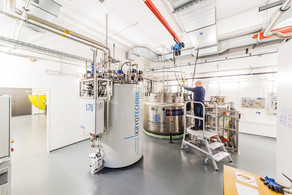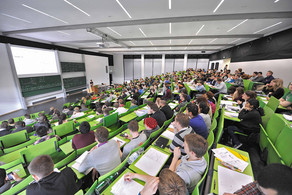Thesis defense of Tim Fabian Höhne
- Defense
This thesis comprises recent applications of the renormalization group (RG) based concept of Planck safety (PS) in beyond the Standard Model of particle physics (SM, BSM) model building. PS refers to a RG flow of all couplings up to the quantum gravity regime at the Planck scale without any vacuum instabilities or Landau poles. This requires to cure the metastability of the SM Higgs potential. We tackle this task in several minimal SM extensions featuring vectorlike fermions, singlet scalars or both, with or without flavor. We investigate the higher looporder RG flows of these models, scrutinizing their complete available parameter spaces spanned by BSM masses, multiplicities, charges and couplings. Thereby, we unveil and characterize several fundamental mechanisms for PS as well as their interplay. Requiring PS then results in constraints on BSM parameters. We also study the collider phenomenology of our models, focusing in particular on the complementarity between phenomenological and PS constraints. We then turn to a class of more complex BSM models, namely flavorful, anomaly-free Z‘ models. The Z‘ boson can induce flavor-changing neutral current transitions at tree-level, which in the SM are loop- and Cabibbo-Kobayashi-Maskawa-suppressed. Therefore, Z‘ models are natural candidates to address several experimentally measured deviations from the SM in flavor observables. In particular, we focus on the persistent anomalies in b -> s μ+ μ- transitions as well as the large CP and U-spin breaking in D0 -> K+ K- , π+ π- decays. On the other hand, Z‘ models are generically plagued by low-energy Landau poles spoiling the predictivity of the theory. We show how the flavor anomalies in the beauty and charm sector can respectively be resolved in Z‘ models while the notorious Landau pole is simultaneously pushed beyond the Planck scale. This results in distinct predictions of characteristic phenomenological signatures that can be searched for at colliders.









